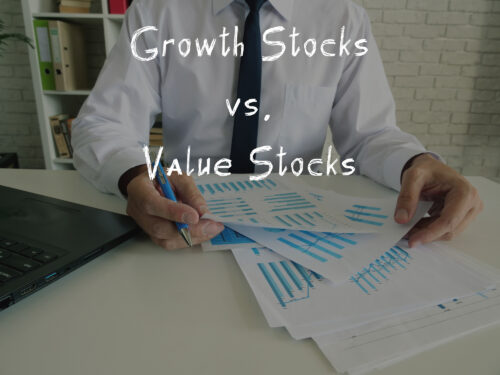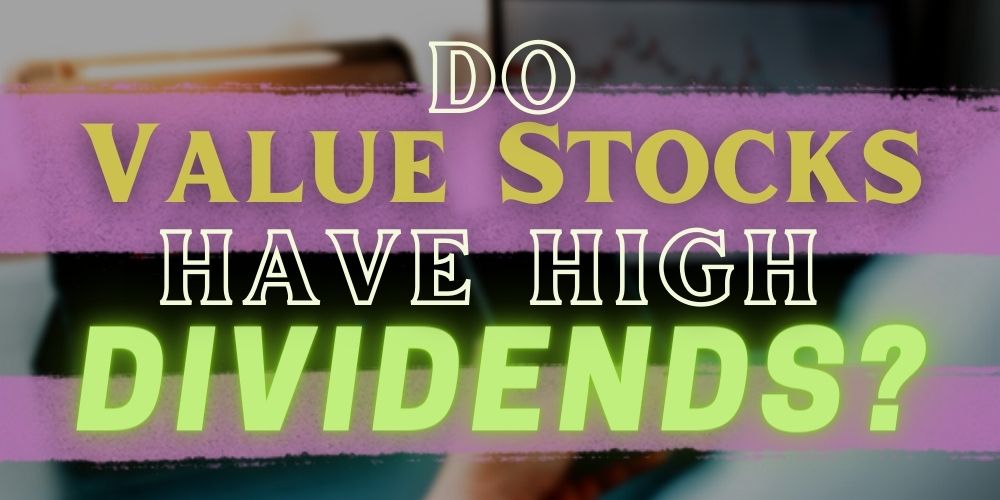Most investors believe that value stocks tend to have high dividend yields. But do value stocks have high dividends? Let’s look closely at the relationship between value stocks and dividends.
What Qualifies as a Value Stock?
When it comes to stocks, there are a lot of different ways to classify them. One common method is whether they are considered growth stocks or value stocks.

There are a few key criteria that investors look for:
First and foremost, value stocks should be trading at a significant discount to their intrinsic value. This can be measured in several ways, but one common method is to compare the stock’s price-to-earnings ratio (P/E) to its earnings growth rate.
If the P/E is low relative to the earnings growth rate, the stock may be considered a value stock.
Another key criterion is that value stocks should have strong fundamentals. This means they should have a history of strong financial performance, with solid balance sheets and consistent cash flows.
Additionally, value stocks tend to be under-followed by analysts and investors, which can create an opportunity for patient investors to find an attractive investment.
Are Dividend and Value Stocks the Same?
Dividend stocks and value stocks are often lumped together, but they have quite different characteristics.
Dividend stocks tend to be large, established companies that pay regular dividends to shareholders. On the other hand, value stocks are typically smaller companies trading at a discount to their intrinsic value.
Of course, there is some overlap between the two groups, but dividend stocks generally will be more stable and predictable than value stocks.
If you’re looking for income and stability, dividend stocks are probably the way to go. Value stocks may be a better fit if you’re willing to take on more risk in pursuit of higher returns.
Do All Value Stocks Pay a Dividend?
There’s a common misconception that all value stocks pay dividends. This simply isn’t true. While many value stocks do offer dividend payments, there are plenty of others that don’t.

One reason many investors stick to this myth is that dividend-paying stocks tend to be associated with blue chip companies, which are often considered “safer” investments.
Another possibility is that investors mistakenly believe that all stocks with low price-to-earnings (P/E) ratios are automatically classified as value stocks. Whatever the reason, it’s essential to know that not all value stocks pay dividends.
If you’re specifically looking for dividend-paying stocks, you’ll need to do your research before investing. Fortunately, plenty of resources are available to help you find the right stocks for your portfolio.
Why Do Value Stocks Pay Dividends?
Value stocks have long been associated with dividend payments. Many investors view dividends as one of the key benefits of investing in value stocks.
While there are a number of reasons why value stocks pay dividends, these are some of the most common:
- First, value stocks tend to be large, established companies with a long history of profitability. As such, they have a strong track record of paying dividends to shareholders.
- Second, value stocks tend to be less volatile than growth stocks. This means that value stocks are more likely to maintain their dividend payments during market turmoil than growth companies.
- Finally, dividend payments can provide a source of income for value investors. This can be especially helpful for retired investors or those nearing retirement age.
What Is a Good Dividend Yield?
A dividend yield of 2%-4% or higher is considered good. However, your best dividend yield will depend on your investment goals and strategies.
A dividend yield is a company’s annual or quarterly dividend payment divided by its current stock price. For example, if a company pays out $1 in dividends per share annually and its stock trades at $100 per share, its dividend yield would be 1%.

Dividend yields can be a valuable metric for investors to compare different stocks. A higher dividend yield usually indicates a stock is more affordable, as the annual dividend payments represent a more significant percentage of the stock’s price.
However, it’s important to remember that a high dividend yield is not always a good thing. A company may have a high dividend yield because its stock price has fallen sharply, which could signify financial trouble.
Is It Better to Have a Higher Dividend Yield?
It’s a question that has been debated among investors for years: is it better to have a higher dividend yield or a lower one?
Both approaches have pros and cons, but ultimately it comes down to your investment goals.
If you’re looking for income, a higher dividend yield will be more appealing. After all, you’ll get more money in your pocket each month from the dividends.
However, a higher dividend yield also means that the stock price is likely lower, so you may not see as much capital appreciation over time.
On the other hand, if you’re more interested in capital gains, a lower dividend yield may be the way to go.
The stock price will be higher, giving you the potential to make more money if you sell it down the road. Of course, you’ll also be getting less income from the dividends in the meantime.
If you’re unsure which approach is right for you, it’s always a good idea to speak with a financial advisor to get professional guidance.
Do Value Stocks Have High Dividends?
One key characteristic of value stocks is that they often have high dividend yields. This is because value stocks tend to be mature companies with established businesses and strong cash flows, which allow them to pay out higher dividends to shareholders.

Many investors believe that value stocks have the potential to outperform the market over the long term, as the market may undervalue them and thus offer more upside potential.
However, it is important to remember that a stock with a high dividend yield does not necessarily mean it is a good value stock. There are many factors to consider when determining whether a stock is undervalued or not.
If you are looking for value stocks, don’t forget to consider other factors such as a company’s business model, financial strength, and competitive advantage.
Do Value Stocks Pay Higher Dividends than Growth Stocks?
There is no simple answer to this question, as many factors can affect a company’s dividend policy. However, some research suggests that value stocks may offer higher dividend yields than growth stocks.
Value stocks tend to be companies that are mature and well-established, and as such, they often have a strong track record of paying out dividends to shareholders.

While growth stocks may offer the potential for capital appreciation, value stocks provide stability and income.
There are several reasons why value stocks may pay higher dividends than growth stocks:
- First, value stocks tend to be less volatile than growth stocks, meaning they experience less price fluctuation. This makes them more attractive to income-seeking investors who seek stability in their portfolios.
- Second, because value companies are typically more established, they often have more substantial cash flows and can pay regular dividends.
- Finally, dividend payments are often tax-advantaged for investors, making them an attractive option for those looking to minimize their tax liability.
While there are several reasons why value stocks may pay higher dividends than growth stocks, it is important to remember that each company is unique. There is no guarantee that a value stock will always outperform a growth stock.
Can You Live off Dividends?
Yes, you can live off dividends – but it depends on a few factors. If you’re living off dividends, you’re essentially relying on the income from your investments to cover your living expenses.
This means you must have a stock portfolio that generates enough dividend income to cover your costs. There are a few things to keep in mind if you’re planning to live off dividends:
First, you need to make sure that your portfolio is diversified. This means investing in a variety of different companies across different industries. Diversification will help to minimize risk and protect your portfolio from volatility.
Second, you must ensure that the companies you invest in are reliable dividend payers. Some companies may cut or suspend their dividend payments during tough economic times.
This could leave you short on income when you need it the most. To help mitigate this risk, consider investing in companies with a history of consistent dividend payments.

Third, you need to be mindful of taxes. Dividend income is subject to taxation, so you’ll need to factor this into your budget. Depending on your tax bracket, dividends may be taxed at a lower rate than other forms of income.
Finally, keep in mind that your living expenses may fluctuate over time. As you get older, you may need to adjust your budget to account for inflation or unexpected costs.
This is why it’s important to have a diversified portfolio – so you can generate income from various sources and have flexibility in your budget.
All in all, it takes careful planning and ongoing management to make sure your portfolio generates enough income to cover your costs.
Should I Invest in Value Stocks?
If you’re looking for stocks that offer both value and growth potential, then value stocks may be the right investment. Value stocks are typically undervalued by the market, which means they offer investors the potential to generate above-average returns.
Of course, there’s no guarantee that a value stock will outperform the market, but over the long term, these stocks have historically outperformed their more expensive counterparts.

So, if you’re thinking about investing in stocks, it may be worth considering some value options.
Here are a few things to keep in mind if you’re thinking about investing in value stocks:
- Look for companies with strong fundamentals.
When considering a value stock, it’s important to look at the company’s underlying fundamentals. Strong fundamentals indicate that a company is well-positioned to weather economic downturns and generate long-term growth.
- Consider the company’s valuation.
One of the leading indicators of a value stock is its valuation. Value stocks typically trade at lower price-to-earnings (P/E) ratios than growth stocks.
The P/E ratio is simply a measure of how much investors are willing to pay for each dollar of a company’s earnings. A low P/E ratio indicates that the market undervalues a stock.
- Be patient.
Value stocks can be volatile in the short term, so it’s important to be patient when investing in these types of stocks. Over the long term, however, value stocks have historically outperformed their more expensive counterparts.
Final Thoughts: Do Value Stocks Pay High Dividends?
In conclusion, while high dividend yields are often a sign of a good-value stock, it is not the only factor to consider. You should look at many things before investing in any stock; dividends are just one piece of that puzzle.
By finding companies that trade at a discount to their intrinsic value and have strong fundamentals, you may be able to find some hidden gems in the market.
At the end of the day, it’s essential to research and ensure you understand what you’re buying before investing your hard-earned money.


 Tags:
Tags:










